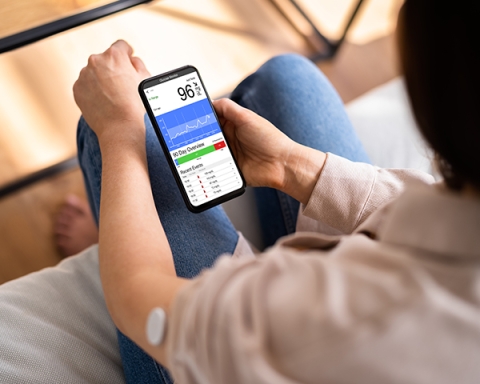
Many of us struggle to consistently engage in healthy habits that optimize our health. For people with a chronic illness like diabetes, the challenge is even greater. As digital health tools become increasingly integrated into chronic disease management, it is critical to understand how patients use and benefit from these technologies.
What were the researchers studying and why?
For adults with diabetes, daily self-management is essential to reducing such complications as nerve damage, kidney failure, and stroke. Key self-management behaviors include taking medications as prescribed, eating a healthy diet, monitoring blood glucose and blood pressure, and getting adequate sleep. However, navigating these routine behaviors can be challenging, and long-term maintenance frequently is a struggle. Clinical trials that show short-term success often see a decline in effectiveness once interventions end, and long-term behavior maintenance rarely is evaluated. Tools like continuous glucose monitors, mobile apps, and activity trackers offer promise for managing diabetes, but their impact on and use in managing health behaviors are not fully understood. This study aimed to explore how adults with type 1 and type 2 diabetes use mobile apps and wearable devices to support their daily health management behaviors.
How did the researchers conduct the study?
The researchers recruited 61 adults ages 18 to 70 years with type 1 or type 2 diabetes via flyers distributed within a hospital system and emails distributed via ResearchMatch. Participants had to be prescribed at least one diabetes medication and could have no other serious illnesses to meet the study criteria. Participants completed a web-based survey that captured sociodemographic information, functional challenges with apps, diabetes management behaviors, and health literacy scores. The researchers assessed both basic and digital health literacy: the ability to find understand, evaluate, and use health-related information with or without electronic sources. Additionally, 18 participants took part in semi-structured interviews, sharing their experiences with tracking diabetes information and using diabetes-related mobile apps.
What did the study results show?
Most respondents had type 2 diabetes (72%) and used insulin (59%) or continuous glucose monitors (56%). Nearly all the participants (98%) owned smartphones, and 94% of participants used the internet to get health-related information. Ninety percent of participants showed “adequate” general health literacy and 82% demonstrated “sufficient” digital health literacy.
Technology use was common: 59% used wearable activity trackers, and 87% had tried health apps—most often for blood glucose monitoring (61%), followed by food tracking (38%) and exercise tracking (28%).
In-depth interviews with 18 participants, predominantly with type 2 diabetes (89%), further explored their experiences with digital tools. Four primary themes emerged:
- Continuous glucose monitors helped participants tailor their daily routines to their individual needs.
- Although tracking health data reassured some participants, others found it stressful or overwhelming.
- Participants expressed preferences for technology that is goal oriented, easy to use, customizable, and capable of integrating data across multiple platforms.
- Authors saw untapped potential in linking data from different tools directly to diabetes management strategies, enabling more informed decision-making.
What is the potential impact of these findings?
This study aims to gather insights on how adults with type 1 and type 2 diabetes use digital health tools to manage their condition, ultimately helping researchers, clinicians, and developers better understand the current landscape of digital diabetes management. Notably, participants tended to be highly educated, so further research on a broader population is warranted before generalizing these findings. Because of their research with this group, the authors suggest that expanding diabetes clinical recommendations to incorporate technologies could help adults better manage their health behaviors with informed decisions.
The findings suggest that personalized, data-driven management strategies could increase both effective diabetes self-management and patients’ sense of ownership over their health. Further development and trials are warranted to understand digital health literacy and digital tools for diabetes management in a broader population.
Citation
Bober, T., Garvin, S., Krall, J., Zupa, M., Low, C., & Rosland, A. M. (2025). Examining How Adults with Diabetes Use Technologies to Support Diabetes Self-Management: Mixed Methods Study. JMIR diabetes, 10, e64505. https://doi.org/10.2196/64505








